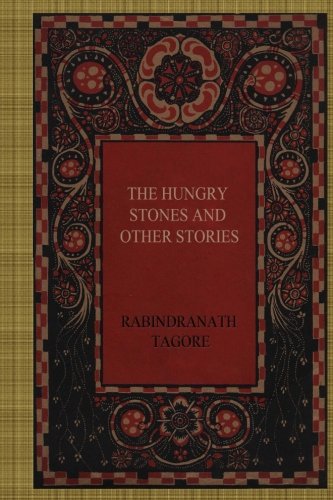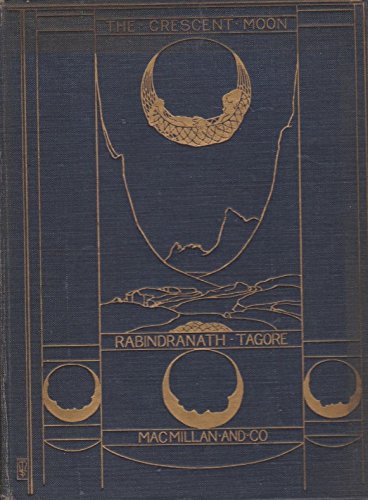-
GITANJALI
RABINDRANATH TAGORE
Paperback (Independently published, May 10, 2018)Comprised of moving, heartfelt prose poems reminiscent of Blake and Gibran — many almost biblical in their rhythms, phrasings, and images — Gitanjali (Song Offerings) was inspired by medieval Indian lyrics of devotion in which the principal subject is love, through some poems detail the internal conflict between spiritual longings and earthly desires, and others depict images drawn from nature.
-
The Post Office
Rabindranath Tagore
Paperback (Wisdom Tree Publishers, May 1, 2012)Originally written in Bengali in 1912 the play narrates the story of a young boy, Amal. Confined to his house because of illness Amal experiences a journey of spiritual awareness, which bestows enduring happiness on him. The play has universal appeal which makes it a world calssic.
-
The Prince and Other Modern Fables
Rabindranath Tagore
Paperback (Penguin Global, Sept. 1, 2004)India's greatest poet of modern times, Nobel Prize-winning author Rabindranath Tagore was a philosopher, a visionary and a storyteller par excellence. His short, lyrical prose fables, set in a generic fairyland or in everyday locales, are philosophical excursions across magical landscapes that speak to the imaginative child in every reader. Now available in a lucid and vibrant translation, this classic collection is sure to enchant modern readers who might never have encountered it before. R
R
-
The Hungry Stones and Other Stories
Rabindranath Tagore
Paperback (CreateSpace Independent Publishing Platform, Dec. 11, 2017)The Hungry Stones And Other Stories is a classic collection of Rabindranath Tagore stories that contains the following Tagore classics: The Hungry Stones; The Victory; Once There Was A King; The Home-coming; My Lord, The Baby and The Kingdom Of Cards.
-
Gitanjali
Rabindranath Tagore
Hardcover (Penguin Books, June 1, 2011)My songs have taken me From place to place In time and space. Described by Rabindranath Tagore as revelations of my true self, the poems and songs of Gitanjali established the writers literary talent worldwide. They include eloquent sonnets such as the famous Where the mind is without fear, intense explorations of love, faith and nature Light, oh where is the light? and tender evocations of childhood When my play was with thee. In this new translation to mark Tagores one-hundred-and-fiftieth birth anniversary, William Radice renders with beauty and precision the poetic rhythm and intensity of the Bengali originals. In his arrangement of Tagores original sequence of poems alongside his translations, Radice restores to Gitanjali the structure, style and conception that were hidden by W. B. Yeatss edition of 1912, making this book a magnificent addition to the Tagore library.
-
Gitanjali
Rabindranath Tagore
Paperback (Independently published, July 6, 2017)Gitanjali is a collection of poems by the Bengali poet Rabindranath Tagore. Tagore received the Nobel Prize for Literature, largely for the book. And is part of the Collection from the UNESCO of Representative Works.
-
Stories from Tagore
Rabindranath Tagore, D. Fog
language (Green Booker Publication, Nov. 27, 2015)Every experienced teacher must have noticed the difficulty of instructing Indian children out of books that are specially intended for use in English schools. It is not merely that the subjects are unfamiliar, but almost every phrase has English associations that are strange to Indian ears. The environment in which they are written is unknown to the Indian school boy and his mind becomes overburdened with its details which he fails to understand. He cannot give his whole attention to the language and thus master it quickly.The present Indian story-book avoids some at least of these impediments. The surroundings described in it are those of the students' everyday life; the sentiments and characters are familiar. The stories are simply told, and the notes at the end will be sufficient to explain obscure passages. It should be possible for the Indian student to follow the pages of the book easily and intelligently. Those students who have read the stories in the original will have the further advantage of knowing beforehand the whole trend of the narrative and thus they will be able to concentrate their thoughts on the English language itself.It is proposed to publish together in a single volume the original stories whose English translations are given in this Reader. Versions of the same stories in the different Indian vernaculars have already appeared, and others are likely to follow.Two of the longest stories in this book—"Master Mashai" and "The Son of Rashmani"—are reproduced in English for the first time. The rest of the stories have been taken, with slight revision, from two English volumes entitled "The Hungry Stones" and "Mashi." A short paragraph has been added from the original Bengali at the end of the story called "The Postmaster." This was unfortunately omitted in the first English edition.The list of words to be studied has been chosen from each story in order to bring to notice different types of English words. The lists are in no sense exhaustive. The end in view has been to endeavour to create an interest in Indian words and their history, which may lead on to further study.
-
Gitanjali: Offerings from the Heart/Audio Cassettes
Rabindranath Tagore
Audio Cassette (Sound Horizons Audio-Video, )None
-
Crescent Moon
Rabindranath Tagore
Hardcover (The Macmillan Co., March 15, 1917)None
-
Nationalism
Rabindranath Tagore
Hardcover (Wentworth Press, Feb. 21, 2019)This work has been selected by scholars as being culturally important, and is part of the knowledge base of civilization as we know it. This work was reproduced from the original artifact, and remains as true to the original work as possible. Therefore, you will see the original copyright references, library stamps (as most of these works have been housed in our most important libraries around the world), and other notations in the work.This work is in the public domain in the United States of America, and possibly other nations. Within the United States, you may freely copy and distribute this work, as no entity (individual or corporate) has a copyright on the body of the work.As a reproduction of a historical artifact, this work may contain missing or blurred pages, poor pictures, errant marks, etc. Scholars believe, and we concur, that this work is important enough to be preserved, reproduced, and made generally available to the public. We appreciate your support of the preservation process, and thank you for being an important part of keeping this knowledge alive and relevant.
-
Gitanjali
Rabindranath Tagore
(Binker North, April 22, 2020)Gitanjali (Song offering) is a collection of poems by the Bengali poet Rabindranath Tagore. Tagore received the Nobel Prize for Literature, largely for the book. And is part of the Collection from the UNESCO of Representative Works. The original Bengali collection of 103/157 poems was published on August 14, 1910. The English Gitanjali or Song Offerings is a collection of 103 English poems of Tagore's own English translations of his Bengali poems first published in November 1912 by the India Society of London. It contained translations of 53 poems from the original Bengali Gitanjali, as well as 50 other poems which were from his drama Achalayatan and eight other books of poetry -- mainly Gitimalya (17 poems), Naivedya (15 poems) and Kheya (11 poems).The translations were often radical, leaving out or altering large chunks of the poem and in one instance fusing two separate poems (song 95, which unifies songs 89,90 of Naivedya). The translations were undertaken prior to a visit to England in 1912, where the poems were extremely well received. In 1913, Tagore became the first non-European to win the Nobel Prize for Literature, largely for the English Gitanjali. The English Gitanjali became popular in the West, and was widely translated. The word gitanjali is composed from "geet", song, and "anjali", offering, and thus means - "An offering of songs"; but the word for offering, anjali, has a strong devotional connotation, so the title may also be interpreted as "prayer offering of song". William Butler Yeats wrote the introduction to the first edition
-
Lover's Gift and Crossing
Rabindranath Tagore
Paperback (Wentworth Press, Feb. 20, 2019)This work has been selected by scholars as being culturally important, and is part of the knowledge base of civilization as we know it. This work was reproduced from the original artifact, and remains as true to the original work as possible. Therefore, you will see the original copyright references, library stamps (as most of these works have been housed in our most important libraries around the world), and other notations in the work.This work is in the public domain in the United States of America, and possibly other nations. Within the United States, you may freely copy and distribute this work, as no entity (individual or corporate) has a copyright on the body of the work.As a reproduction of a historical artifact, this work may contain missing or blurred pages, poor pictures, errant marks, etc. Scholars believe, and we concur, that this work is important enough to be preserved, reproduced, and made generally available to the public. We appreciate your support of the preservation process, and thank you for being an important part of keeping this knowledge alive and relevant.